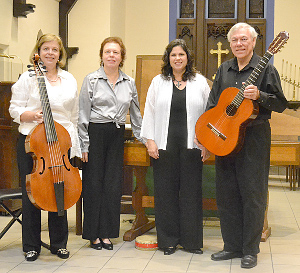This preview provided by Carolina Pro Musica.
Eighteenth-century London dominated the culture of the English-speaking Atlantic. The vast majority of Britain’s printing presses and newspapers were sited there. London had a huge number of coffee-houses and theatres and was home to Britain’s greatest authors and scientists, doctors and thinkers. In intellectual terms it far outpaced the near Universities of Oxford and Cambridge, while the existence of the Royal Society, the great hospitals, and a wealthy and leisured class ensured a vibrant and diverse world of ideas. Although the Royal Court played a decreasing role in patronizing the arts, a popular audience for theatre and printed works grew up in the West End, centered on Covent Garden. Similarly, the great associational charities of the age, the Foundling Hospital, the Magdalen, the Marine Society, took on new cultural roles by both housing art by the likes of William Hogarth and patronizing and publicizing the work of musicians such Handel. (University of Sheffeld, Humanities Resource Institute).
London also became home to other immigrant composers including Pepusch and J.C. Bach who wrote music for the stage. Other cities like Edinburgh attracted European composers like Barsanti.
Thomas Arne was the most successful and popular native composer writing for theater and the London pleasure gardens. Organist and composer John Stanley was the youngest to graduate from Oxford in music having been the organist at St. Paul’s London from the age of 11. His brilliant playing on the organ and harpsichord attracted the attention of other musicians like Handel.
Besides activity of new works for stage and theatre, the composition of songs and dances was in full fashion. Playford began publishing The English Dancing Master in 1651 which would run to 18 edition and continue after Playford’s death. Irish harpers like O’Carolan were composing works for patrons. Many tunes were created which later acquired new words by English poets extending their appeal beyond Ireland, Scotland and Wales. Arrangements of these traditional (folk like) songs were also performed on the same concerts as the compositions of Handel and others. J.C. Bach created arrangements of some of these songs like “The Broome of Cowdenknows”.
Carolina Pro Musica presents a diverse concert of Handel and J.C. Bach arias, sonatas, dances and traditional songs of the Isles in the 18th century. A special tribute to Ireland includes music by the blind harper O’Carolan.
The concert is March 5, 8:00 PM, St. Martin’s Episcopal Church, 1510 E 7th St., Charlotte, NC 28204.
Additional performances:
March 14, 2016, 8:00 PM at Belmont Abbey Basilica, Belmont, NC 28012
and
April 2, 2016, 1:00 PM at the Dallas Historic Courthouse, Dallas, NC 28034 (sponsored by the Gaston Museum of Art & History).
March is Early Music Month (a promotion of Early Music America). This concert is offered as part of the celebration.
Concert and Ticket Details: www.carolinapromusica.org.











